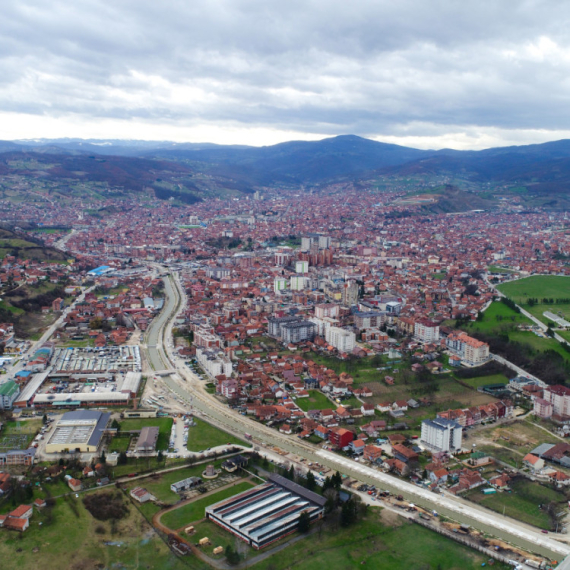Kosovo assembly adopts constitution
The Kosovo assembly today adopted the province’s new constitution, which will come into force on June 15.
Wednesday, 09.04.2008.
12:16

The Kosovo assembly today adopted the province’s new constitution, which will come into force on June 15. All 103 MPs that attended today’s session voted in favor of the constitution. Kosovo assembly adopts constitution The constitution contains 40 chapters and 160 articles, and stipulates that Kosovo is a "parliamentary republic, and that the highest power lies with the president". It also states that "Albanian and Serbian are the official languages of Kosovo". Last week, as envisaged by the htisaari plan, the draft constitution was approved by the EU representative to Kosovo Pieter Feith. Kosovo Minister Slobodan Samardzic says today’s adoption of the Kosovo constitution was an “illegal act.” “That constitution is completely illegal and illegitimate from the point of view of Serbia, the Serbs that live in Kosovo, and international law, as the whole set of measures of enacting laws based on the Ahtisaari Plan, and this constitution, have been carried out without a Security Council decision,” Samardzic told a press conference this afternoon. According to the minister, Serbia had expected such developments, though by no means everything was going according to the Kosovo institutions’ plans. “It seems to me that the hands that are playing with that Rubik’s cube aren’t too skillful, as many things are not going to plan. The UN Security Council is keeping quiet about this, but it does not accept the policy of certain countries that have recognized Kosovo independence, while Serbia is conducting a policy against independence that is bearing results,“ he said. Samardzic added that it would be very interesting to see whether the EU would continue the stabilization and association process with Kosovo as an independent state after June. “Should the EU happen to do that, and does it only with independent states, that would automatically mean that the EU was breaching Article 135 of our agreement on stabilization and association with the EU, where Kosovo’s position is clearly defined,“ the minister explained. He said that the initiative to allow Serbia to sign the Stabilization and Association Agreement (SAA) before the elections was a very unsuitable offer. “It’s highly unsuitable to use such an important matter as the agreement for election purposes. That degrades and denigrates the agreement’s very content, that so much has been said about, and which is so important to Serbia,” said Samardzic. On the subject of discontent among employees that had left the Kosovo institutions at Belgrade’s request, and were now seeking help from the government, the minister said that the problem was that the government had not adopted the act guaranteeing compensation for those workers that had quit their posts. He said that he thought the problem would be solved quickly since the act existed, and there was a determination to help these people. Samardzic said that his ministry was not responsible for the suspended prison workers in Lipljan, or for the Radio Gracanica journalists, and that their plight should be handled by the relevant ministries. Meanwhile, the Russian Foreign Ministry said today that the preparation of Kosovo's constitution was an attempt to bolster the province's self-proclaimed independence with a pseudo-legal basis, and was a resumption of the separatist policy of Pristina and its patrons in violation of international law. The ministry said in a statement that it was evident that the section of Kosovo's population that did not accept unilaterally declared independence would not accept the future constitutional organization of the province, and that the situation could only deteriorate as a result. “Instead of the forced creation of the external attributes of an illegal state, it is necessary to think about an acceptable outcome that can be achieved only in dialogue between Belgrade and Pristina,” the statement read. “In an effort to make it appear that there is a plan coordinated by the international community, they evoke the famous provisions of the Martti Ahtisaari Plan that never received UN Security Council support and essentially represented a failed attempt to impose a unilateral solution on the Kosovo issue,” Moscow said. It was stressed that claims that the European Union had allegedly approved the preparation and adoption of the Kosovo constitution were incomprehensible, because it was well known that there was no consensus on Kosovo's independence within Brussels.
Kosovo assembly adopts constitution
The constitution contains 40 chapters and 160 articles, and stipulates that Kosovo is a "parliamentary republic, and that the highest power lies with the president".It also states that "Albanian and Serbian are the official languages of Kosovo".
Last week, as envisaged by the htisaari plan, the draft constitution was approved by the EU representative to Kosovo Pieter Feith.
Kosovo Minister Slobodan Samardžić says today’s adoption of the Kosovo constitution was an “illegal act.”
“That constitution is completely illegal and illegitimate from the point of view of Serbia, the Serbs that live in Kosovo, and international law, as the whole set of measures of enacting laws based on the Ahtisaari Plan, and this constitution, have been carried out without a Security Council decision,” Samardžić told a press conference this afternoon.
According to the minister, Serbia had expected such developments, though by no means everything was going according to the Kosovo institutions’ plans.
“It seems to me that the hands that are playing with that Rubik’s cube aren’t too skillful, as many things are not going to plan. The UN Security Council is keeping quiet about this, but it does not accept the policy of certain countries that have recognized Kosovo independence, while Serbia is conducting a policy against independence that is bearing results,“ he said.
Samardžić added that it would be very interesting to see whether the EU would continue the stabilization and association process with Kosovo as an independent state after June.
“Should the EU happen to do that, and does it only with independent states, that would automatically mean that the EU was breaching Article 135 of our agreement on stabilization and association with the EU, where Kosovo’s position is clearly defined,“ the minister explained.
He said that the initiative to allow Serbia to sign the Stabilization and Association Agreement (SAA) before the elections was a very unsuitable offer.
“It’s highly unsuitable to use such an important matter as the agreement for election purposes. That degrades and denigrates the agreement’s very content, that so much has been said about, and which is so important to Serbia,” said Samardžić.
On the subject of discontent among employees that had left the Kosovo institutions at Belgrade’s request, and were now seeking help from the government, the minister said that the problem was that the government had not adopted the act guaranteeing compensation for those workers that had quit their posts.
He said that he thought the problem would be solved quickly since the act existed, and there was a determination to help these people.
Samardžić said that his ministry was not responsible for the suspended prison workers in Lipljan, or for the Radio Gračanica journalists, and that their plight should be handled by the relevant ministries.
Meanwhile, the Russian Foreign Ministry said today that the preparation of Kosovo's constitution was an attempt to bolster the province's self-proclaimed independence with a pseudo-legal basis, and was a resumption of the separatist policy of Priština and its patrons in violation of international law.
The ministry said in a statement that it was evident that the section of Kosovo's population that did not accept unilaterally declared independence would not accept the future constitutional organization of the province, and that the situation could only deteriorate as a result.
“Instead of the forced creation of the external attributes of an illegal state, it is necessary to think about an acceptable outcome that can be achieved only in dialogue between Belgrade and Priština,” the statement read.
“In an effort to make it appear that there is a plan coordinated by the international community, they evoke the famous provisions of the Martti Ahtisaari Plan that never received UN Security Council support and essentially represented a failed attempt to impose a unilateral solution on the Kosovo issue,” Moscow said.
It was stressed that claims that the European Union had allegedly approved the preparation and adoption of the Kosovo constitution were incomprehensible, because it was well known that there was no consensus on Kosovo's independence within Brussels.




































Komentari 8
Pogledaj komentare